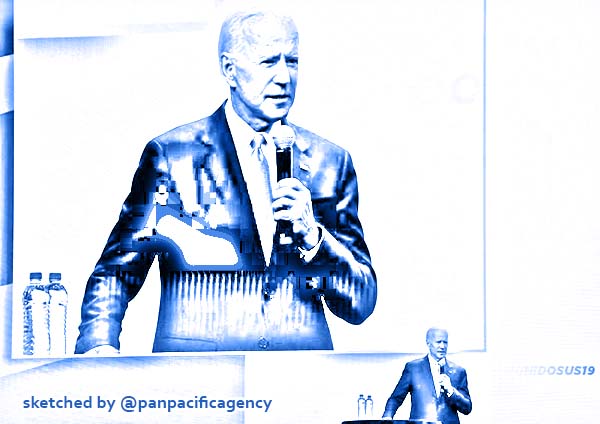Biden victory may create unfavorable business conditions for Korea

Democratic 2020 presidential candidate and former U.S Vice President Joe Biden speaks at the UnidosUS Annual Conference, in San Diego, California, U.S., August 5, 2019. REUTERS/Mike Blake. Sketched by the Pan Pacific Agency.
SEOUL, Nov 6, 2020, The Korea Times. Former Vice President Joe Biden is very close to securing a win over incumbent President Donald Trump, and if he officially takes the Oval Office will push for trade and economic policies with political conditions attached, a state think tank said Thursday, forcing Korea to walk a tightrope between the U.S and China, The Korea Times reported.
The government will have to increase its preparedness against politically charged demands from the world’s two-largest economies; otherwise, the export-reliant country could see its economy taking a major hit, as evidenced by the fallout experienced in 2017 amid an intensified feud over the deployment of a U.S. Terminal High Altitude Area Defense (THAAD) anti-missile defense system here.
The country will be able to become part of a supply chain to be set up by the U.S. in the latter’s bid to cut its reliance on China amid the pandemic, a move prompted by the growing risks now associated with offshoring.
Korean firms operating in the U.S. will face calls to improve conditions for local workers, a key voter base of the union-backed Biden whose close aides are likely to be filled by those who prioritize labor and environmental values over global trade promotion.
“It will be all about striking a balance between the two,” Moon Jong-chol, a research fellow at the Korea Institute for Industrial Economics & Trade (KIET) said. “Washington will ask Beijing to abide by global trade rules involving technology and security issues, as part of a broader alternative to win the hegemonic war following failed attempts to push Beijing to adopt a free market economy.”
The change, he said, followed an assessment that the Chinese economy flourishing meant a greater threat to the U.S. as a global power. This why local think tanks believe Biden, in the best-case scenario, will not seek economic cooperation nor “toleration” with China whose increased capabilities to challenge America have become a serious concern.
“Whatever choice made by Korea will have major economic implications with many businesses caught in the crossfire. Whatever Korea does, it should never lose the trust of both countries,” Moon said.
He said the U.S may seek to rejoin the Trans-Pacific Partnership (TPP), a proposed trade agreement among 11 countries, about three years after the Trump administration withdrew from it in 2017. In this scenario, Korea should consider joining the agreement to enjoy measures to lower both non-tariff and tariff barriers to trade.
The 11 countries are Australia, Brunei, Canada, Chile, Japan, Malaysia, Mexico, New Zealand, Peru, Singapore and Vietnam.
“If the U.S. does rejoin the agreement, rules on environmental and labor issues for Korean firms will become tighter, due to strengthened protectionism. This could lead to higher trade barriers for Korean steelmakers and automakers, not to mention petrochemical, high-tech and textile industries,” Moon noted.
By Lee Kyung-min